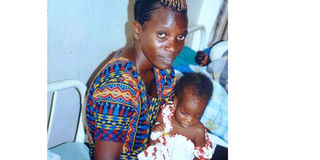A couple’s anguish of suffering a miscarriage

Rhodah Namubiru carries Claire Kisakye who succumbed to cancer in September 2015. PHOTO BY Moses Muwulya.
What you need to know:
- Having a miscarriage breaks even the strongest of hearts.
- Moses Muwulya, a journalist and wife Rhodah share their distress and how they overcame it.
When my wife Rhodah Namubiru, 27, conceived early this year, delight is what filled us as a couple.
After our second child succumbed to retinoblastoma (eye cancer) in September 2015, we were left in distress and looked forward to having another child. We were excited, expecting the baby to cover the wounds left by the demise of our daughter.
However, barely two months into the pregnancy, my wife suffered a miscarriage. She had no idea that what started as mild painless bleeding could result into the loss of her treasured baby.
“A month after conception, I started bleeding on and off for about two days. The bleeding would become severe at night, accompanied by abdominal pain. I thought it was not serious and did not seek help until it was too late,” she sorrowfully recalls.
Who said men do not cry? I could not hold back my tears after Rhodah called to tell me the sad news. I thought of all the positive things our child would have brought to our lives. Knowing this would not be possible, caused unbearable pain.
However, with counselling from a relative who had gone through two consecutive miscarriages, we managed to pull through.
What is miscarriage?
Miscarriage is the spontaneous (natural) loss of a pregnancy before 28 weeks. It usually happens when the pregnancy is in its first and second trimester.
Dr Ssenyondo Gonzaga, a consultant Obstetric and Gynecologist, notes that spontaneous miscarriages are common, though outweighed by induced ones.
He says much as it is largely a onetime occurrence, one can experience recurrent miscarriages, especially if the likely causes are not identified and treated.
He emphasises that when one experiences a miscarriage, they should go for a medical checkup to establish the likely cause and treat it to avoid recurrent miscarriages.
But most importantly, he says it is good to establish if the miscarriage is complete, since there are cases where parts of the fetus may remain inside the womb leading to infections.
Ssenyondo says the true causes, especially for first time miscarriages are largely unknown but shares some of the notable risk implicated causes which include:
Genetic malformations
This is when the fetus fails to develop well. It is linked to lack of micro nutrients that support the pregnancy. “The first eight weeks of pregnancy are vital for the formation of the fetus. The baby’s basic organs should all be formed by the end of the eight weeks, after which the baby just increases in size,” Ssenyondo says.
He says if a mother does not have such needed micro nutrients, there are high chances of miscarriage and if the fetus survives, there will be congenital abnormality and high chances of having a deformed baby.
Hormonal imbalances
Dr Ssenyondo explains that once one conceives, a hormone called progesterone is needed to support the pregnancy.
“Some expectant mothers have progesterone insufficiency leading to sudden loss of the baby,” he notes
Weak cervix
Dr Ssenyondo further explains that in case of prior unsafe deliveries and abortions, especially when done by unskilled personnel, a cervix may be damaged rendering it incompetent to hold a subsequent pregnancy.
A Cervix is the mouth of the uterus which closes and keeps the pregnancy intact. He says before one conceives, a checkup is essential to rule this out.
Untreated STIs
Dr Ssenyondo says infections need to be tested and treated before one conceives or immediately after conception to reduce the risks.
Malaria
Malaria is an emerging cause of spontaneous abortions, but doctors note that it mostly threatens pregnancies beyond the second trimester. Dr Ssenyondo says due to changes caused by conception, pregnant mothers’ immunity gets compromised, predisposing them to severe forms of malaria leading to miscarriages
Stress
Like any other psychological factor, the doctor says it may contribute to a miscarriage because it lowers immunity thus giving room to opportunistic causes. Asked about the warning signs, the gynecologist shares that a pregnant woman should not bleed and any sign of bleeding must be taken seriously because it the biggest sign of miscarriage.
How to cope
Dr Senyondo says it is good for a mother or a couple to seek professional assistance to establish the cause of a miscarriage. This, he says, reduces risks of a recurrent miscarriage especially when recurrent risk factors such as hormonal imbalances and untreated infections were key causes.
“We put the victim on post abortion care to avoid any likely complications especially in the event of an incomplete miscarriage,” Dr Ssenyondo explains. Post abortion family planning may also be administered. The mother is put on short term contraceptives such as injections or condoms to avoid re-conception.
“Whether a miscarriage was induced or spontaneous, ovulation, especially when one miscarried in the first trimester, happens within 11 days,” Dr Senyondo notes
This, he says, increases the chances of getting pregnant yet it is not ideal to conceive shortly after a miscarriage. He notes that usually a period of four to six months is recommended, before one re-conceives, depending on the circumstances.
Because of the high expectations, my wife says she wished to conceive as soon as possible. However, the Dr warned against this saying it may cause another miscarriage, especially when the cause is not treated.
To avoid any risk of early conception, the couple was enrolled on post abortion family planning, where short term birth control methods such as condoms were recommended.




